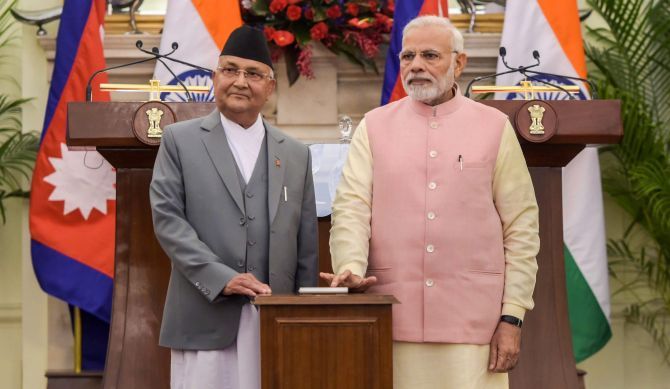The two PMs agreed to construct a new electrified rail line, with India's financial support, connecting Raxaul in India to Kathmandu.

Seeking to reset ties, Prime Minister Narendra Modi and his Nepalese counterpart K P Sharma Oli on Saturday held wide-ranging talks and vowed to step up overall engagement and take the relationship to newer heights on the basis of 'equality, mutual trust and respect'.
After the delegation-level talks, Modi said India will always stand by Nepal in its quest for all-round growth, asserting that deeper cooperation between the two neighbours will strengthen democracy in Nepal.
In his press statement, Oli, who is seen as favouring a closer relationship with China, said his government wants to build a strong edifice of 'trust-based' relationship between the two nations.
"Relations between neighbours are different from those of others. Neighbourhood realities make peaceful coexistence, based on the principles of equality, justice, mutual respect and benefits a necessity for shared destiny," Oli said in the statement in presence of Modi.
Both the prime ministers called the talks 'very satisfactory', Foreign Secretary Vijay Gokhale told reporters, adding the focus of the deliberations were on boosting cooperation in sectors like defence and security, agriculture, trade besides enhance connectivity through railway network and water ways.
"I have come to India this time with a mission to explore ways and means to enhance our relations to newer heights, commensurate with the realities of the 21st century. We want to erect a strong edifice of trust-based relations between the two close neighbours that we are. We want to create a model relationship," Oli said.
According to a joint statement, the two prime ministers resolved to work together to take bilateral relations to newer heights on the basis of 'equality, mutual trust, respect and benefit'.
There were indications that India was losing its leverage in Nepal and it became more apparent after the victory of the left alliance in the general elections following which Oli was sworn in as the prime minister.
In 2016, Oli had publicly criticised New Delhi for interfering in Nepal's internal matters and accused it of toppling his government.
"Being close neighbours, our destiny is intertwined. Prosperity is our common goal," said Oli.
Gokhale said Modi conveyed to Oli that India will remain a reliable partner of Nepal and it is committed to deepen its ties with Kathmandu.
According to the joint statement, the prime ministers of India and Nepal agreed to construct a new electrified rail line, with India's financial support, connecting Raxaul in India to Kathmandu.
Both sides also decided to develop the inland waterways for the movement of cargo, within the framework of trade and transit arrangements, providing additional access to sea for Nepal.
Interestingly, no bilateral agreements were signed after the talks between the two sides.
The Nepalese prime minister said he also shared with Modi Nepal's concerns about alarming scale of trade deficit and stressed on the need of implementing measures to expand Nepal's export.
Assuring all possible support to Nepal, Modi said the Nepalese prime minister's vision for a 'prosperous Nepal and developed Nepal' was in sync with his vision of 'sabka sath sabka vikas' (together with all, development for all).
The two sides released separate joint statements agriculture, railway linkages and connectivity through inland waterways.
Recalling his meeting with Modi two years ago, Oli said since then, Nepal has achieved comprehensive transformation in many ways.
"Having reached a stage of political stability following the recent elections, Nepal has now embarked on the joinery of social-economic development with the motto 'prosperous Nepal: happy Nepalis'," he said.
Modi also hailed successful conduct of national and provincial polls in Nepal and complimented its people for reposing their faith in the democracy.
The prime minister said India will continue to support Nepal as per that country's priorities, adding both sides have agreed to expedite all connectivity projects.
The prime minister said both sides will enhance defence and security ties. "We have strong relations when it comes to the aspect of security. We will work together to stop misuse of our open border," Modi said.
Oli also invited Modi to visit Nepal.
"I invited PM Modi to pay a visit to Nepal at the earliest convenient time, I am hopeful that the visit will take place soon," he said.
Gokhale said Modi is expected to visit Kathmandu this year.
Modi said there has been a long history of India's contribution towards Nepal's development and that he has assured Oli that it will continue.
The Nepalese prime minister said his country needs support from its friends adding 'relations among neighbours is different from other relations. This is based on mutual respect'.
The two prime ministers inaugurated the integrated check post at Birgunj in Nepal through remote control from here which is expected to enhance cross-border trade.
The two prime ministers also witnessed the ground breaking ceremony of the Motihari-Amlekhgunj cross-border petroleum products pipeline at Motihari.
The two prime ministers underlined the need for expeditious implementation of bilateral projects in Nepal, and to reinvigorate the existing bilateral mechanisms to promote cooperative agenda across diverse spheres.
Oli said he has also conveyed to Modi Nepal's desire to see an early realisation of the open market provision of the bilateral power trade agreement, which was concluded between the two sides in 2014.










